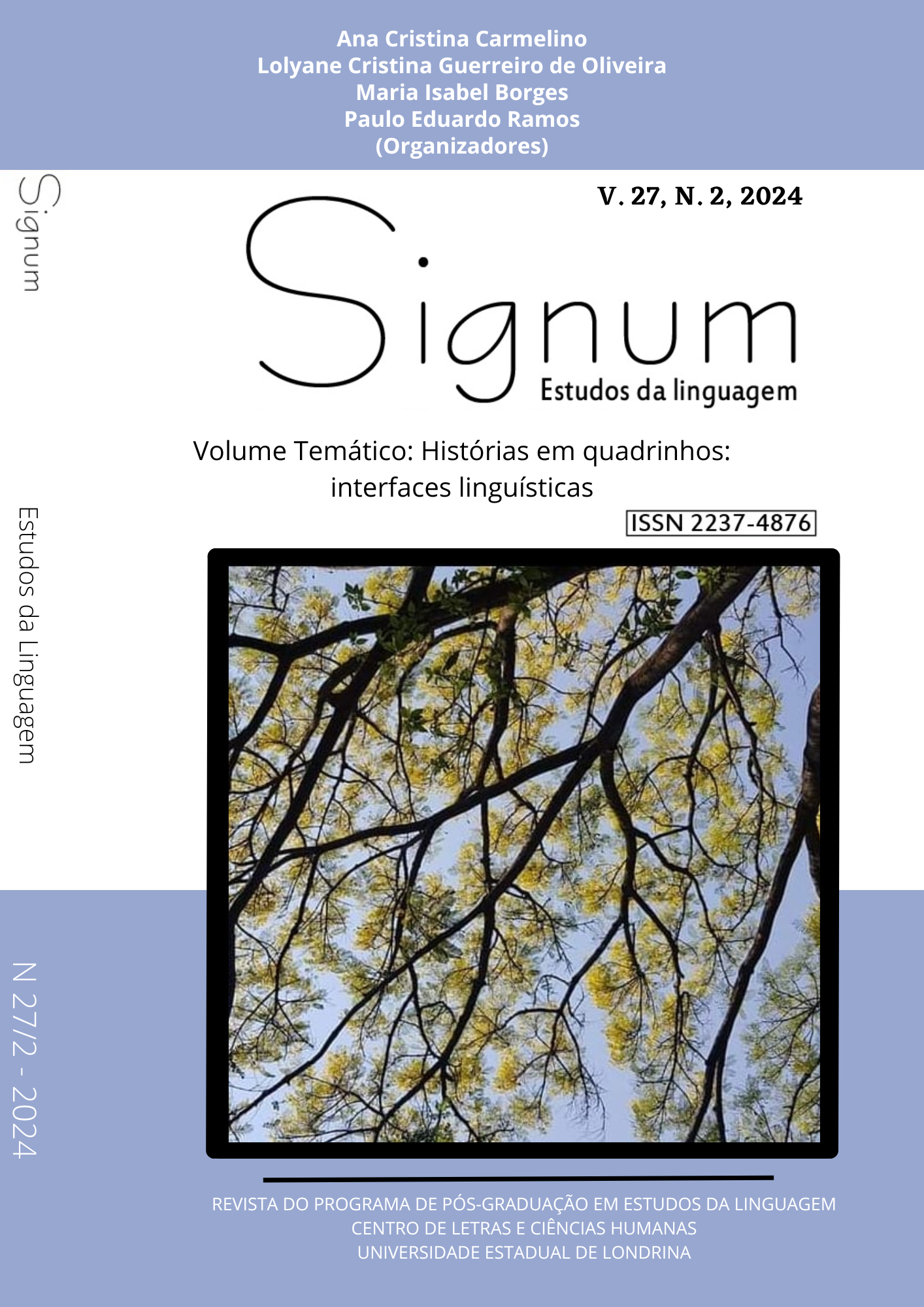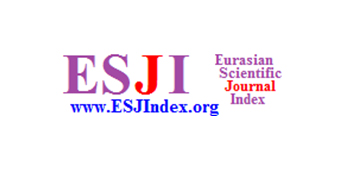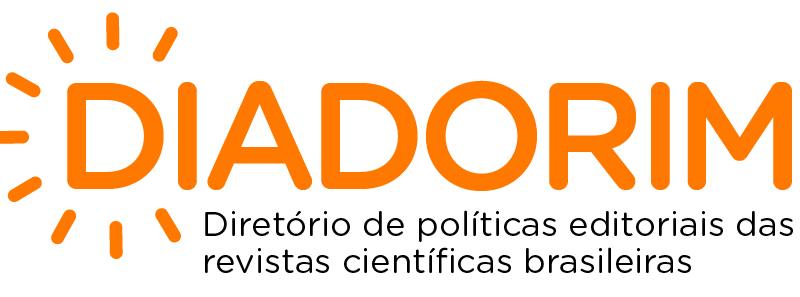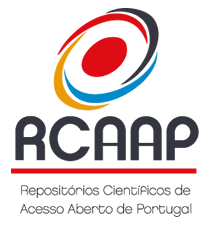O Afrofuturismo na Adaptação Sequencial de Kindred (2017)
DOI:
https://doi.org/10.5433/2237-4876.2024v27n2p14-26Palavras-chave:
Afrofuturismo, Histórias em quadrinhos, Kindred (2017)Resumo
A adaptação sequencial Kindred (2017) narra as experiências e vivências da protagonista, Dana, frente à escravidão e ao racismo, durante as suas diversas viagens no tempo à Maryland do século XIX, nos Estados Unidos da América. Esta história em quadrinhos é uma adaptação do romance afrofuturístico epônimo da escritora estadunidense Octavia E. Butler de 1979, pelas mãos dos cartunistas Damian Duffy e John Jennings. Por meio das representações interseccionais entre gênero, poder e raça, eles ilustram mais vividamente as violências enfrentadas por Dana em uma plantação do antigo Antebellum. Desta forma, os objetivos desta pesquisa foram identificar os principais elementos afrofuturísticos aplicados na adaptação e verificar como os recursos sequenciais foram utilizados tanto para intensificar a experiência leitora, quanto para promover uma adaptação mais fidedigna (Cartmell, 1999). Por intermédio da metodologia desconstrutivista (Derrida, 2010; Evans, 2020; Shaikh, 2022), identificamos um revisionismo profundo sobre as relações entre gênero, poder e raça. Por conseguinte, este revisionismo resultou em uma pletora de representações sequenciais acerca das reinterpretações, reconstruções e reconciliações históricas. Os cartunistas não sugerem esquecer o passado, mas compreendê-lo como uma entidade hodierna.
Downloads
Referências
BLOOMFIELD, David. Reconciliation After Violent Conflict A Handbook. Handbook Series. Holmberg & Holmberg Design AB: Sweden, 2003.
BRAYBOY, B. M. Toward a tribal critical race theory in education. The Urban Review, 37 (5), 425-446, 2006.
BUROCCO, Laura. Afrofuturismo e o devir negro do mundo. Revista Arte e Ensaios, n. 38, julho de 2019. Disponível em: https://revistas.ufrj.br/index.php/ae/article/view/26373/15167 Acesso em: 04 mar. 2024.
CARTMELL, Deborah. Adaptations: From Text to Screen, Screen to Text, London: Routledge, 1999.
DERRIDA, J. Grammatology. London Routledge Press, 2010.
DONALDSON, Eileen. A contested freedom: The fragile future of Octavia Butler's Kindred. In: English Academy Review: Southern African Journal of English Studies, 31:2, 94-107, 2014.
EVANS, C. Strategies of Deconstruction: Derrida and the Myth of the Voice. USA: University of Minnesota Press, 2020.
FIELDER, T. Infinitum: An Afrofuturist Tale. Amistad: New York, 2021.
FOLKE, C., S. R. Carpenter, B. Walker, M. Scheffer, T. Chapin, and J. Rockström. 2010. Resilience Thinking: Integrating Resilience, Adaptability and Transformability. Ecology and Society 15 (4). Disponível em <http://www.ecologyandsociety.org/vol15/iss4/art20/>. Acessado em 16/01/2024.
FOUCAULT, M. A ordem do discurso. Universidade Federal de Goiás. Goiânia, 2004.
FREUD, S. O estranho. In S. Freud. Obras psicológicas completas de Sigmund Freud (J. Salomão, Trad.). Rio de Janeiro, RJ: Imago. (Obra originalmente publicada em 1919), 2020.
GODDARD, STACEY. Embedded Revisionism: Networks, Institutions, and Challenges to World Order. In: International Organization, 72 (4): 763-97, 2018.
HAWKING, Stephen. Uma Breve História do Tempo. Rio de Janeiro: Editora Intrínseca, 2015.
HOFSTEDE, G. Culture and Organizations: Software and the Mind. New York: McGraw-Hill Companies, 2007.
JEMISIN, N. K. Far Sector. DC Comics: New York, 2021.
JENNINGS, J.; DUFFY, D. Kindred: A Graphic Novel Adaptation. ‎ Abrams Comicarts, 2017.
MCGREGOR, D; BUCKLER, R; GRAHAM, B; LEE, S. Black Panther. Penguin Classics Marvel Collection: London, 2016.
MCNEESE, Tim. The Civil Rights Movement; Striving for Justice. Infobase Publishing, 2008.
SAID, E. Orientalism. New York: Vintage Books, 2010.
SCOTT, Astrada. Home and Dwelling: Re-Examining Race and Identity Through Octavia Butler's Kindred and Paul Beatty's The Sellout In: Journal of French and Francophone Philosophy Revue de la philosophie française et de langue française. Vol. XXV, N. 1, 2017.
SHAIKH, Hadi. Structuralism and Post-Structuralism. Philadelphia. University of Pennsylvania Press, 2022.
SIMMEL, G. Conflict and the Web of Group Affiliations. Trad. Kurt H. Wolff and Reinhard Bendix. New York: Simon and Schuster, 2010.
SUMMERS, Mark Wahlgren. The Ordeal of the Reunion: A New History of Reconstruction. Chapel Hill: University of North Carolina Press, 2015.
TEGMARK, M. Our Mathematical Universe: My Quest for the Ultimate Nature of Reality. Random House, New York, London, 2014.
THOMAS, C. D. Inheritors of the Earth. How Nature Is Thriving in an Age of Extinction. London: Allen Lane, 2017.
TUCKER, Aviezer. Historiographic Revision and Revisionism. Budapest: Central European University Press, 2008.
TYRRELL, Ian R. Historians in Public: The Practice of American History, 1890-1970. Chicago: U of Chicago P, 2005.
YOUNG, Iris M., in Global Challenges: War, Self-Determination and Responsibility for Global Justice. Responsibility, Social Connection and Global Labour Justice, Cambridge, Polity :160-186, 2007.
WIGGS, Kimber L. "The Trouble: Family, Genre, and Hybridity in Octavia Butler's Kindred." In: Mosaic: an interdisciplinary critical journal. Vol. 54 no. 1, p. 129-145, 2021.
WINDISCH, S., SIMI, P., BLEE, K., and DEMICHELE, M. Understanding the Micro- Situational Dynamics of White Supremacist Violence in the United States. Routledge: New York, 2018.
Downloads
Publicado
Como Citar
Edição
Seção
Licença
Copyright (c) 2024 Carlos Eduardo de Araujo Placido, Dr. Nataniel dos Santos Gomes

Este trabalho está licenciado sob uma licença Creative Commons Attribution-NonCommercial-NoDerivatives 4.0 International License.
Signum: Estudos da linguagem, publica seus artigos licenciados sob a Licença Atribuição-NãoComercial-CompartilhaIgual 4.0 Internacional. Esta licença permite que terceiros façam download e compartilhem os trabalhos em qualquer meio ou formato, desde que atribuam o devido crédito de autoria, mas sem que possam alterá-los de nenhuma forma ou utilizá-los para fins comerciais. Se você remixar, transformar ou desenvolver o material, não poderá distribuir o material modificado.

















